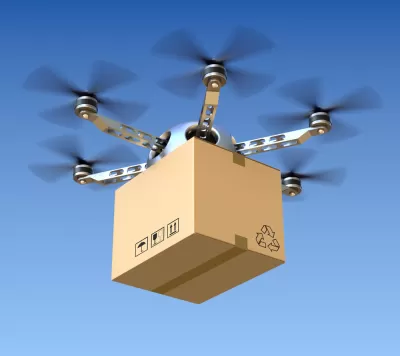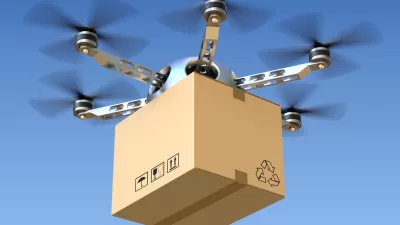Ultra-fast drone delivery promises convenience, but comes at a high cost for workers, the environment, and public space.

Drone delivery promises ultra-fast, convenient delivery of everyday goods right to your door. But there's a darker side, write Michael Richardson, Jake Goldenfein, and Thao Phan. "Drone delivery at scale will transform the skies, change expectations for speedy delivery, and hide the labour that makes it possible."
Wing, an Alphabet-owned delivery company that has made 100,000 deliveries to date in Australia, "operates much like many app delivery platforms. After signing up, customers use the smartphone app to place their orders. Orders are then packed at local base stations and flown to their destinations by Wing’s drones." But questions remain about how the service would operate in more complicated environments than the "clear and uncomplicated airspace" and "flat, regular urban environment" of its test sites, Canberra and Logan. Additionally, "automated" tech obscures the hidden human cost.
In the same way that Amazon's private delivery services created higher demand for ultra-fast package delivery, the "unbelievably fast" delivery times promised by Wing shifts customer expectations for other delivery services. "While Wing’s drones are autonomous, the service still relies on human labour. Pilots monitor flight paths, packers parcel up the products, and maintenance staff take care of the hardware and software. All of these workers must perform to satisfy the 10 minute delivery time." These "punishing delivery times," the authors argue, "can be dangerous for worker safety and devastating for morale."
In addition to the harm caused to workers, "drone delivery may also have hidden environmental costs:" lithium mining for batteries, energy consumption for data centers, more packaging and waste, and potential risks to birds and habitats. Moreover, "[d]rone delivery risks privatising a new layer of that common space, and handing it over to Alphabet and others." Australia–and other countries–would have to change their regulations regarding drones and create new digital infrastructures, a step that Alphabet is heavily involved in. "While city skies crowded with delivery drones might be far away, the groundwork is being laid right now. Communities, businesses and workers need to be a much bigger part of the process of deciding if they want that future."
FULL STORY: Privatising the sky: drone delivery promises comfort and speed, but at a cost to workers and communities

Montreal Mall to Become 6,000 Housing Units
Place Versailles will be transformed into a mixed-use complex over the next 25 years.

Planetizen Federal Action Tracker
A weekly monitor of how Trump’s orders and actions are impacting planners and planning in America.

DARTSpace Platform Streamlines Dallas TOD Application Process
The Dallas transit agency hopes a shorter permitting timeline will boost transit-oriented development around rail stations.

Interactive Map Reveals America's “Shade Deserts”
Launched by UCLA and American Forests to combat heat-related deaths, the tool maps the shade infrastructure for over 360 U.S. cities.

Bicycles and Books — In Sacramento, Libraries Now Offer Both
Adult library card holders can check out e-bikes and e-trikes for up to one week.

Colorado Landfills Emit as Much Pollution as 1M Cars
Landfills are the third-largest source of methane pollution in Colorado, after agriculture and fossil fuel extraction.
Urban Design for Planners 1: Software Tools
This six-course series explores essential urban design concepts using open source software and equips planners with the tools they need to participate fully in the urban design process.
Planning for Universal Design
Learn the tools for implementing Universal Design in planning regulations.
City of Mt Shasta
City of Camden Redevelopment Agency
City of Astoria
Transportation Research & Education Center (TREC) at Portland State University
US High Speed Rail Association
City of Camden Redevelopment Agency
Municipality of Princeton (NJ)





























